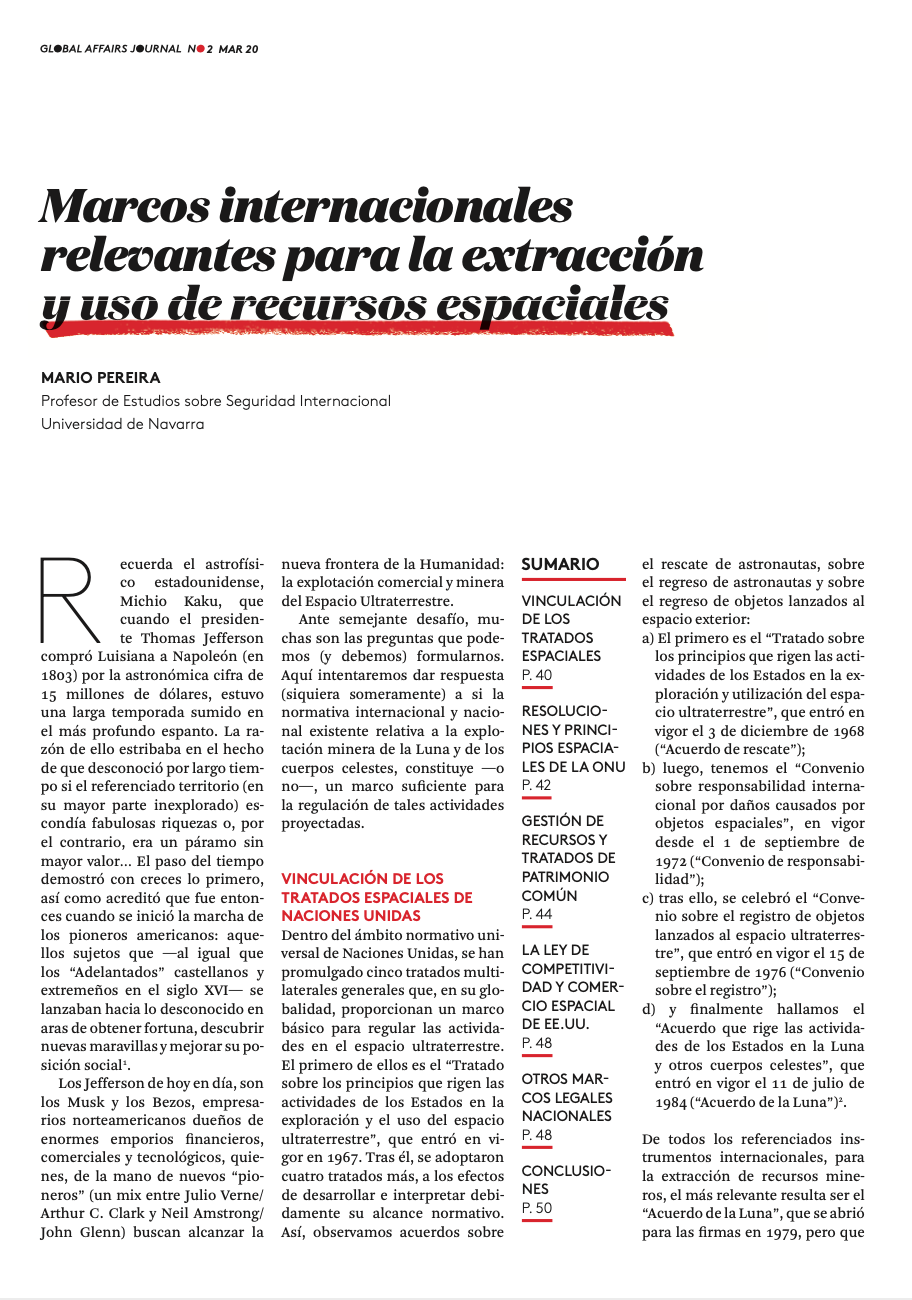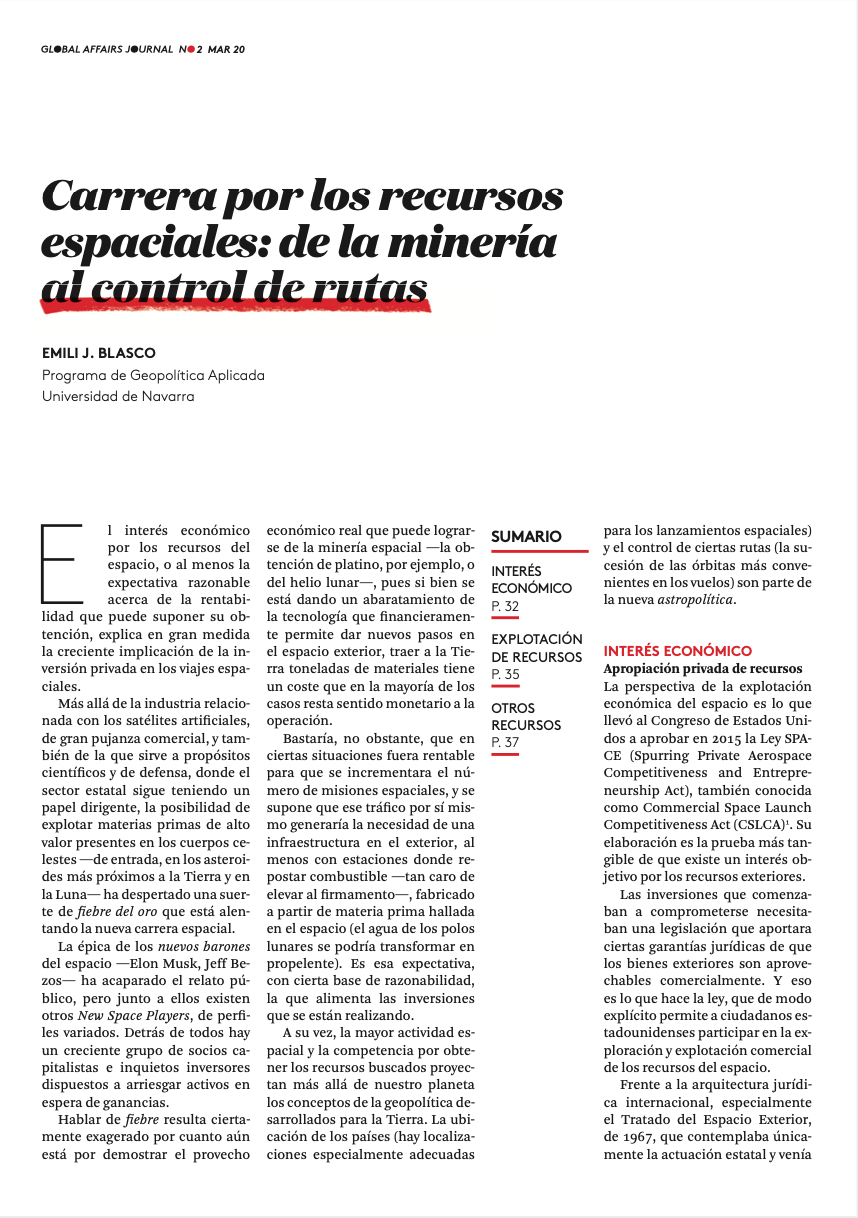Ruta de navegación
Blogs
Entries with label space mining .
![Insight into mineral extraction on an asteroid, from ExplainingTheFuture.com [Christopher Barnatt]. Insight into mineral extraction on an asteroid, from ExplainingTheFuture.com [Christopher Barnatt].](/documents/10174/16849987/gaj-foto-4.jpg)
▲ Vision for mineral extraction on an asteroid, from ExplainingTheFuture.com [Christopher Barnatt].
GLOBAL AFFAIRS JOURNAL / Mario Pereira
 [14-page document. downloadin PDF]
[14-page document. downloadin PDF]
INTRODUCTION
The American astrophysicist Michio Kaku recalls that when President Thomas Jefferson bought Louisiana from Napoleon (in 1803) for the astronomical sum of 15 million dollars, he spent a long period of time in deep fear. The reason for this lay in the fact that he did not know for a long time whether the territory (mostly unexplored) hid fabulous riches or, on the contrary, was a worthless wasteland... The passage of time proved the former, as well as proving that it was then that the march of the American pioneers began: those people who - like the "Adelantados" of Castile and Extremadura in the 16th century - set out for the unknown in order to make their fortune, discover new wonders and improve their social position.
The Jeffersons of today are the Musks and the Bezos, American businessmen, owners of huge financial, commercial and technological empires, who, hand in hand with new "pioneers" (a mix between Jules Verne/Arthur C. Clark and Neil Armstrong/John Glenn) seek to reach the new frontier of Humanity: the commercial and mining exploitation of Outer Space.
Faced with such a challenge, many questions can (and should) be asked. Here we will try to answer (at least briefly) whether the existing international and national rules and regulations on the mining of the Moon and celestial bodies constitutes - or does not constitute - a sufficient framework for the regulation of such planned activities.
![proposal of a lunar base for obtaining helium, taken from ExplainingTheFuture.com [Christopher Barnatt]. proposal of a lunar base for obtaining helium, taken from ExplainingTheFuture.com [Christopher Barnatt].](/documents/10174/16849987/gaj-foto-3.jpg)
▲ proposal of a lunar base for obtaining helium, taken from ExplainingTheFuture.com [Christopher Barnatt].
GLOBAL AFFAIRS JOURNAL / Emili J. Blasco
 [8-page document. downloadin PDF]
[8-page document. downloadin PDF]
INTRODUCTION
The economic interest in space resources, or at least the reasonable expectation of the profitability of obtaining them, goes a long way to explaining the growing involvement of private investment in space travel.
Beyond the commercially strong artificial satellite industry, as well as those serving scientific and defence purposes, where the state sector continues to play a leading role, the possibility of exploiting high-value raw materials present on celestial bodies - from entrance, on the closest asteroids to the Earth and on the Moon - has awakened a kind of gold rush that is fuelling the new space degree program .
The epic of the new space barons - Elon Musk, Jeff Bezos - has captured the public narrative, but alongside them there are other New Space Players, with varied profiles. Behind them all is a growing group of equity partners and restless investors willing to risk assets in the hope of profit.
To talk of space mining fever is certainly exaggerated, as the real economic benefit to be gained from space mining - obtaining platinum, for example, or lunar helium - has yet to be demonstrated. While the technology is becoming cheaper, financially enabling new steps into outer space, bringing tons of materials back to Earth has a cost that in most cases makes the operation less financially meaningful.
It would be enough, however, that in certain situations it would be profitable to increase the number of space missions issue , and it is assumed that this traffic in itself would generate the need for an infrastructure abroad, at least with stations to refuel fuel - so expensive to lift into the sky - manufactured from subject raw materials found in space (the water at the lunar poles could be transformed into propellant). It is this expectation, with some basis in reasonableness, that is fuelling the investments being made.
In turn, increased space activity and the skill to obtain the resources sought project beyond our planet the concepts of geopolitics developed for Earth. The location of countries (there are particularly suitable locations for space launches) and the control of certain routes (the succession of the most convenient flight orbits) are part of the new astro-politics.
